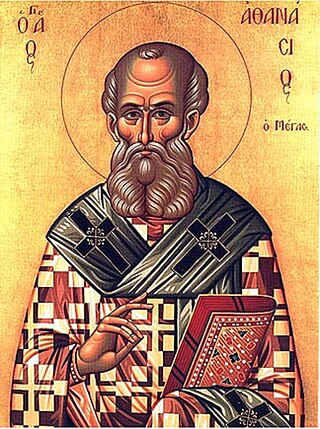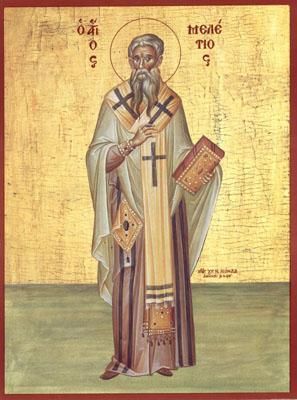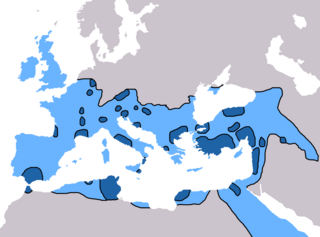Further reading
- Proceedings of the council, among the letters of Ambrose
- Herbermann, Charles, ed. (1913). . Catholic Encyclopedia . New York: Robert Appleton Company.
Palladius of Ratiaria (modern Archar Bulgaria) was a late 4th century Arian Christian theologian, based in the Roman province of Dacia in modern Romania.
He was deposed from his office, together with Secundianus of Singidunum, at the Council of Aquileia, held in 381 AD.
The Council of Aquileia in 381 AD was a church synod which was part of the struggle between Arian and orthodox ideas in Christianity. It was one of five councils of Aquileia.
Palladius had applied to the Emperor of the East for an opportunity to clear himself before a general council of these charges concerning the nature of Christ. Palladius was unwilling to submit to a council of the Western bishops only, for Ambrose had previously assured the Emperor of the West that such a matter as the soundness or heresy of just two bishops might be settled by a council simply consisting of the bishops of the Diocese of Italy alone. Politics and Christology were inextricably entangled in the 4th century: "You have contrived, as appears by the sacred document (Gratian's amended convocation) which you have brought forward, that this should not be a full and General Council: in the absence of our Colleagues we cannot answer", was Palladius' stand.
Ambrose proposed that Arius' letter from Nicomedia to Alexander, bishop of Alexandria, should be read in detail, and Palladius be called upon to defend or condemn each heretical proposition that disputed Catholic orthodoxy. Arius had said that the Father alone is eternal; the Catholics insisted that the Son was co-eternal. Palladius quoted Scripture, which Ambrose skirted. Ambrose rested upon the verbal formulas recently agreed upon by authority of the Church, while Palladius refused to admit the legitimacy of the proceedings. The other bishops unanimously pronounced anathema on all counts, and the matter was settled. Of Palladius it is said by Vigilius, a late 5th century bishop of Thapsus in Africa, that after Ambrose's death (397), he wrote a reply to Ambrose's writings against Arianism, which Vigilius in turn wrote to counter.

Arianism is a Christological doctrine first attributed to Arius, a Christian presbyter from Alexandria, Egypt. Arian theology holds that Jesus Christ is the Son of God, who was begotten by God the Father with the difference that the Son of God did not always exist but was begotten/made before "time" by God the Father; therefore, Jesus was not coeternal with God the Father, but at the same time Jesus began to exist outside time as time applies only to the creations of God.

Ambrose of Milan, venerated as Saint Ambrose, was a theologian and statesman who served as Bishop of Milan from 374 to 397. He expressed himself prominently as a public figure, fiercely promoting Roman Christianity against Arianism and paganism. He left a substantial collection of writings, of which the best known include the ethical commentary De officiis ministrorum (377–391), and the exegetical Exameron (386–390). His preachings, his actions and his literary works, in addition to his innovative musical hymnography, made him one of the most influential ecclesiastical figures of the 4th century.

Athanasius I of Alexandria, also called Athanasius the Great, Athanasius the Confessor, or, among Coptic Christians, Athanasius the Apostolic, was a church father and the 20th pope of Alexandria. His intermittent episcopacy spanned 45 years, of which over 17 encompassed five exiles, when he was replaced on the order of four different Roman emperors. Athanasius was a Christian theologian, a Church Father, the chief defender of Trinitarianism against Arianism, and a noted Egyptian Christian leader of the fourth century.
Eusebius of Nicomedia was an Arian priest who baptized Constantine the Great on his deathbed in 337. A fifth-century legend evolved that Pope Sylvester I was the one to baptize Constantine, but this is dismissed by scholars as a forgery 'to amend the historical memory of the Arian baptism that the emperor received at the end of his life, and instead to attribute an unequivocally orthodox baptism to him.' He was a bishop of Berytus in Phoenicia. He was later made the bishop of Nicomedia, where the Imperial court resided. He lived finally in Constantinople from 338 up to his death.
The First Council of Nicaea was a council of Christian bishops convened in the Bithynian city of Nicaea by the Roman Emperor Constantine I in AD 325.
Year 381 (CCCLXXXI) was a common year starting on Friday of the Julian calendar. At the time, it was known as the Year of the Consulship of Syagrius and Eucherius. The denomination 381 for this year has been used since the early medieval period, when the Anno Domini calendar era became the prevalent method in Europe for naming years.

Saint Meletius was a Christian bishop of Antioch from 360 until his death in 381. He was opposed by a rival bishop named Paulinus and his episcopate was dominated by the schism, usually called the Meletian schism. As a result, he was exiled from Antioch in 361–362, 365–366 and 371–378. One of his last acts was to preside over the First Council of Constantinople in 381.

Arius was a Cyrenaic presbyter, ascetic, and priest best known for the doctrine of Arianism. His teachings about the nature of the Godhead in Christianity, which emphasized God the Father's uniqueness and Christ's subordination under the Father, and his opposition to what would become the dominant Christology made him a primary topic of the First Council of Nicaea convened by Emperor Constantine the Great in 325.
In the history of Christianity and later of the Roman Catholic Church, there have been several Councils of Aquileia. The Roman city of Aquileia at the head of the Adriatic is the seat of an ancient episcopal see, seat of the Patriarch of Aquileia.

Alexander I of Alexandria was the 19th Pope and Patriarch of Alexandria. During his patriarchate, he dealt with a number of issues facing the Church in that day. These included the dating of Easter, the actions of Meletius of Lycopolis, and the issue of greatest substance, Arianism. He was the leader of the opposition to Arianism at the First Council of Nicaea. He also mentored his successor, Athanasius of Alexandria, who would become one of the Church Fathers.

The Patriarchate of Aquileia was an episcopal see in northeastern Italy, centred on the ancient city of Aquileia situated at the head of the Adriatic, on what is now the Italian seacoast. For many centuries it played an important part in history, particularly in that of the Holy See and northern Italy, and a number of church councils were held there.

Ratiaria was a city founded by the Moesians, a Daco-Thracian tribe, in the 4th century BC, along the river Danube. In Roman times it was named Colonia Ulpia Traiana Ratiaria.
In the history of Christianity, the first seven ecumenical councils include the following: the First Council of Nicaea in 325, the First Council of Constantinople in 381, the Council of Ephesus in 431, the Council of Chalcedon in 451, the Second Council of Constantinople in 553, the Third Council of Constantinople from 680–681 and finally, the Second Council of Nicaea in 787. All of the seven councils were convened in modern-day Turkey.

Christianity in the 4th century was dominated in its early stage by Constantine the Great and the First Council of Nicaea of 325, which was the beginning of the period of the First seven Ecumenical Councils (325–787), and in its late stage by the Edict of Thessalonica of 380, which made Nicene Christianity the state church of the Roman Empire.

Christianity in late antiquity traces Christianity during the Christian Roman Empire – the period from the rise of Christianity under Emperor Constantine, until the fall of the Western Roman Empire. The end-date of this period varies because the transition to the sub-Roman period occurred gradually and at different times in different areas. One may generally date late ancient Christianity as lasting to the late 6th century and the re-conquests under Justinian of the Byzantine Empire, though a more traditional end-date is 476, the year in which Odoacer deposed Romulus Augustus, traditionally considered the last western emperor.

Saint Vigilius of Trent is venerated as the patron saint and bishop of Trent. He should not be confused with the pope of the same name.
The Council of Aquileia in 381 AD was a church synod which was part of the struggle between Arian and orthodox ideas in Christianity. It was one of five councils of Aquileia.
Secundianus of Singidunum was bishop of Singidunum. Little is known of his life; except that he was condemned for heresy at the Council of Aquileia in 381.

Justus of Lyon was the 13th Bishop of Lyon. He succeeded Verissimus in the mid-4th century. He is venerated as a saint by both the Catholic and the Orthodox Church, with a feast day on 2 September. Around 350, Justus was made Bishop of Lyon. As bishop of the capital of Gaul, he was among the participants of the Council of Valencia of 374 regarding religious discipline of the clergy and the faithful. He later became a hermit.
Vigilius of Thapsus also known as Vigilius Tapsensis, Vigilius Afer, or Vergil of Tapso, was a 5th-century Bishop of Thapsus in the province Byzacium, in what is now Tunisia, and as well as a theological writer and polemicist.